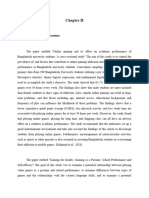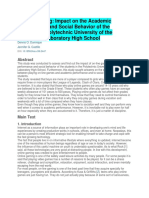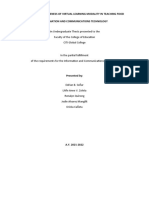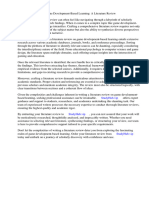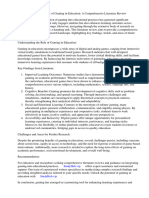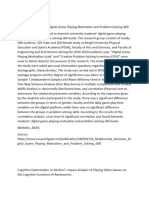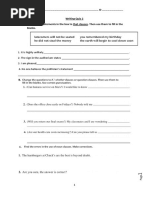Educational Game-Based Training (EGT) For Enhancing Ethics in Academic Writing in EFL Context
Educational Game-Based Training (EGT) For Enhancing Ethics in Academic Writing in EFL Context
Uploaded by
Meow MemyselfCopyright:
Available Formats
Educational Game-Based Training (EGT) For Enhancing Ethics in Academic Writing in EFL Context
Educational Game-Based Training (EGT) For Enhancing Ethics in Academic Writing in EFL Context
Uploaded by
Meow MemyselfOriginal Title
Copyright
Available Formats
Share this document
Did you find this document useful?
Is this content inappropriate?
Copyright:
Available Formats
Educational Game-Based Training (EGT) For Enhancing Ethics in Academic Writing in EFL Context
Educational Game-Based Training (EGT) For Enhancing Ethics in Academic Writing in EFL Context
Uploaded by
Meow MemyselfCopyright:
Available Formats
Educational Game-Based Training (EGT) for Enhancing Ethics in Academic Writing in
EFL Context
Playing games offers enjoyment, passionate involvement, motivation, satisfaction creativity, and
social interaction. Consequently, game could thus be explicitly designed
with educational purposes to be used in training specific subject and to teach a skill. This article
elucidates the results of an ongoing research project on the implementation of the game-based
training designed to make the implicit understandings on plagiarism to be explicit among
postgraduate students. In this article, the analysis of types and degrees of plagiarism found in
theses in four Thai research universities were obtained through plagiarism detecting software as
well as manual techniques. In addition, 30 postgraduate students (15 PhDs and 15 MAs) were
recruited on voluntary basis. The pre-test was administered to obtain their knowledge on
plagiarism and the perception towards various scenarios in academic writing prior to the
Educational Game-Based Training on ethics in academic writing. Later, the participants
played a 45-minute interactive games that teaches the participants goals, rules, adaptation,
problem-solving, interaction, all represented as scenarios. The post-test were then undertaken.
The results from the two research instruments were statically analyzed to find the effects of the
educational game-based training on patterns, frequencies, and quantity of plagiarism. The
disparity between the students’ understanding of plagiarism, strengths, weaknesses and also are
also used in evaluating the Educational Game-Based Training as well as to find a logical
connection among the games, the pre- and post-tests scores, and plagiarism in the theses. The
results showed that correlation between pre-test and post-test scores of all participants. It was
evident that there was a strong relationship between the participants’ satisfaction score in playing
the games and their post-test scores on implicit understandings on plagiarism and ethics in
academic writing. This could shade light on engaging postgraduate students in a learning activity
through explicit scenarios to create understanding in plagiarism problems from interaction
educational games. It should also be reminded that in order to keep the learners motivated and
involved in the learning throughout the games, it is essential to allow them to win and to lose in
the games.
You might also like
- The Gamification of Learning and Instruction: Game-based Methods and Strategies for Training and EducationFrom EverandThe Gamification of Learning and Instruction: Game-based Methods and Strategies for Training and EducationRating: 1 out of 5 stars1/5 (1)
- Extensive Reading Activities PDFDocument13 pagesExtensive Reading Activities PDFMeow Memyself50% (6)
- S90hla enDocument2 pagesS90hla enmatpocNo ratings yet
- Basics of Piping EngineeringDocument43 pagesBasics of Piping EngineeringAyush100% (1)
- Credit Card Statement: Repayment SlipDocument5 pagesCredit Card Statement: Repayment SlipDS QwerityNo ratings yet
- Chapter 2Document6 pagesChapter 2Ajay JumagdaoNo ratings yet
- Team Malic Gaming Habits and Academic ResultsDocument7 pagesTeam Malic Gaming Habits and Academic Resultsjohngabriel072005No ratings yet
- ResearchDocument13 pagesResearchkobejohngicosNo ratings yet
- Online Gaming A WPS Office - 083758Document10 pagesOnline Gaming A WPS Office - 083758haroldmosquite123No ratings yet
- Rob Final Asg Etec 500Document14 pagesRob Final Asg Etec 500api-378883636No ratings yet
- Insights On Lean Gamifications For Higher EducationDocument18 pagesInsights On Lean Gamifications For Higher EducationHadi P.No ratings yet
- s10936 023 09983 yDocument21 pagess10936 023 09983 yLuís TeixeiraNo ratings yet
- Reducing Plagiarism Rate With A GameDocument2 pagesReducing Plagiarism Rate With A GameMeow MemyselfNo ratings yet
- Cheche ResearchDocument3 pagesCheche ResearchRovern Keith Oro CuencaNo ratings yet
- Revise Sa Game Based 1 3 1Document33 pagesRevise Sa Game Based 1 3 1arron digalNo ratings yet
- Chapter IIDocument6 pagesChapter IIbananachachaaarotNo ratings yet
- The Effect of Gender On Motivation and Student Achievement in Digital Game-Based Learning: A Case Study of A Contented-Based ClassroomDocument19 pagesThe Effect of Gender On Motivation and Student Achievement in Digital Game-Based Learning: A Case Study of A Contented-Based ClassroomHUI JIUN LEENo ratings yet
- JPPR20 HHMDocument17 pagesJPPR20 HHMCelvin GayoNo ratings yet
- MEDT 8484 - BenjaminGreen - Media and Technology Future ResearchDocument4 pagesMEDT 8484 - BenjaminGreen - Media and Technology Future Researchbenjamin greenNo ratings yet
- Effects of Computer Games To Students ThesisDocument8 pagesEffects of Computer Games To Students Thesistheresasinghseattle100% (2)
- Garys Final 605 Final VersionDocument11 pagesGarys Final 605 Final Versionapi-448857858No ratings yet
- Computers & Education: Kai-Hsiang Yang, Bou-Chuan LuDocument13 pagesComputers & Education: Kai-Hsiang Yang, Bou-Chuan LuFollet TortugaNo ratings yet
- Online Gaming: Impact On The Academic Performance and Social Behavior of The Students in Polytechnic University of The Philippines Laboratory High SchoolDocument5 pagesOnline Gaming: Impact On The Academic Performance and Social Behavior of The Students in Polytechnic University of The Philippines Laboratory High SchoolMaylani TambunanNo ratings yet
- Impact of Second Language AquisitionDocument3 pagesImpact of Second Language Aquisitionapi-247167834No ratings yet
- Online Gaming Attitude Among Computer Programming StudentsDocument24 pagesOnline Gaming Attitude Among Computer Programming StudentsAnne TepaceNo ratings yet
- Online GamingDocument21 pagesOnline Gamingarrow3966692marklloydNo ratings yet
- Integration of GamesDocument2 pagesIntegration of GamesyenismeeeNo ratings yet
- Online GamingDocument4 pagesOnline GamingKarl LouieNo ratings yet
- Online GamingDocument21 pagesOnline GamingSamNo ratings yet
- Online GamingDocument5 pagesOnline GamingLerr Real RelleNo ratings yet
- Online Gaming ProDocument34 pagesOnline Gaming ProJanelle Chin MesamenNo ratings yet
- Analyzing The Impact of Mobile Games Towards Academic Performance of Student in Basilan National High SchoolDocument9 pagesAnalyzing The Impact of Mobile Games Towards Academic Performance of Student in Basilan National High Schoolsalmangapor154No ratings yet
- Effectiveness ofDocument58 pagesEffectiveness ofEdrian SenarNo ratings yet
- Document PDFDocument3 pagesDocument PDFMelecio CabahugNo ratings yet
- A Guideline For Game Development-Based Learning A Literature ReviewDocument7 pagesA Guideline For Game Development-Based Learning A Literature ReviewafmzethlgpqoybNo ratings yet
- Mobile Gaming and Problematic Smartphone Use: A Comparative Study Between Belgium and FinlandDocument10 pagesMobile Gaming and Problematic Smartphone Use: A Comparative Study Between Belgium and FinlandLea BartolomeNo ratings yet
- Greg Research123 3Document8 pagesGreg Research123 3baldibiagreg25No ratings yet
- A Literature Review of Gaming in Education Research ReportDocument5 pagesA Literature Review of Gaming in Education Research ReporteyewhyvkgNo ratings yet
- Quanti PR2Document43 pagesQuanti PR2Jhon Paul CrusioNo ratings yet
- 3is Research ProposalDocument17 pages3is Research ProposalHarold MaribojocNo ratings yet
- RRL, Local, ForeignDocument9 pagesRRL, Local, ForeignKorai HoshiumiNo ratings yet
- Yu2020-The Effect of Educational Games On Learning Outcomes, Student Motivation, Engagement and SatisfactionDocument25 pagesYu2020-The Effect of Educational Games On Learning Outcomes, Student Motivation, Engagement and Satisfactiongsalvador2207No ratings yet
- The Effects of Online Games On Typing Skills of STDocument19 pagesThe Effects of Online Games On Typing Skills of STJhon Pol CailaoNo ratings yet
- Online Gaming Impact On The Academic Performance and Social Behavior of The Students in Polytechnic University of The PhilippinDocument1 pageOnline Gaming Impact On The Academic Performance and Social Behavior of The Students in Polytechnic University of The PhilippinYena MoicsNo ratings yet
- The Effects of Online Games On Typing Skills of STDocument8 pagesThe Effects of Online Games On Typing Skills of STJhon Pol CailaoNo ratings yet
- Haruna 2023 (Hand Srcing)Document20 pagesHaruna 2023 (Hand Srcing)afri pakalessyNo ratings yet
- Significance of The StudyDocument3 pagesSignificance of The StudyShyla BernalesNo ratings yet
- III2Document13 pagesIII2AngelepalerNo ratings yet
- Involucrar A Los Estudiantes en El Proceso de Aprendizaje Con El Aprendizaje Basado en Juegos. El Conceptos FundamentalesDocument12 pagesInvolucrar A Los Estudiantes en El Proceso de Aprendizaje Con El Aprendizaje Basado en Juegos. El Conceptos Fundamentalesmariana_lagos_castroNo ratings yet
- Chapter 3 Team LapukkDocument5 pagesChapter 3 Team Lapukkjohngabriel0730No ratings yet
- Draft 2Document1 pageDraft 2Wina MaeNo ratings yet
- Chapter 2Document9 pagesChapter 2Laica Mae NarvajaNo ratings yet
- Game Based Learning Literature ReviewDocument15 pagesGame Based Learning Literature Reviewaflsjzblf100% (1)
- Effects of Computer Games ThesisDocument4 pagesEffects of Computer Games ThesisBuyCustomPapersSingapore100% (2)
- RESEARCH DEFENSE Chapter 1 3Document19 pagesRESEARCH DEFENSE Chapter 1 3Cjay AtisorNo ratings yet
- The Impact of Video Gaming To The Academic Performance of The Psychology Students in San Beda UniversityDocument5 pagesThe Impact of Video Gaming To The Academic Performance of The Psychology Students in San Beda UniversityMarky Laury GameplaysNo ratings yet
- Noneducational Board Games in University Education Perceptions of Students Experiencing Gamebased Learning MethodologiesDocument18 pagesNoneducational Board Games in University Education Perceptions of Students Experiencing Gamebased Learning Methodologiesjuana8pelaezNo ratings yet
- Computer Gamers Academic Performance in A Technological State College in Leyte, PhilippinesDocument9 pagesComputer Gamers Academic Performance in A Technological State College in Leyte, PhilippinesMichael Angelo ZorillaNo ratings yet
- LISA PROJECT (Chapters 1, 2, 3, & 4)Document31 pagesLISA PROJECT (Chapters 1, 2, 3, & 4)gwemeowenNo ratings yet
- Lisa Project (Final)Document37 pagesLisa Project (Final)gwemeowenNo ratings yet
- Title_ _The Eff-WPS Office_Recover_RecoverDocument4 pagesTitle_ _The Eff-WPS Office_Recover_RecoverJoshua De JesusNo ratings yet
- Research Khecy (2)Document12 pagesResearch Khecy (2)Mayagtan LucelNo ratings yet
- Introduce YourselfDocument1 pageIntroduce YourselfMeow MemyselfNo ratings yet
- Reducing Plagiarism Rate With A GameDocument2 pagesReducing Plagiarism Rate With A GameMeow MemyselfNo ratings yet
- The First Advice Is TimeDocument2 pagesThe First Advice Is TimeMeow MemyselfNo ratings yet
- Have Surveyed: InvestigateDocument2 pagesHave Surveyed: InvestigateMeow MemyselfNo ratings yet
- Finishing Unit 2: Finding The LinksDocument10 pagesFinishing Unit 2: Finding The LinksMeow MemyselfNo ratings yet
- Writing Quiz 2 A. Change The Statements in The Box To That Clauses. Then Use Them To Fill in The BlanksDocument4 pagesWriting Quiz 2 A. Change The Statements in The Box To That Clauses. Then Use Them To Fill in The BlanksMeow MemyselfNo ratings yet
- January 2017: NotesDocument12 pagesJanuary 2017: NotesMeow MemyselfNo ratings yet
- EFL Classes: Diverse Aspects of Learning and TeachingDocument6 pagesEFL Classes: Diverse Aspects of Learning and TeachingMeow MemyselfNo ratings yet
- Worksheet A: Interviewer Applicant .Document2 pagesWorksheet A: Interviewer Applicant .Meow MemyselfNo ratings yet
- Unit 4: Identifying The PatternDocument17 pagesUnit 4: Identifying The PatternMeow MemyselfNo ratings yet
- Tape Script 1 (Chapter 1)Document7 pagesTape Script 1 (Chapter 1)Meow MemyselfNo ratings yet
- Worksheet B: Applicant InterviewerDocument2 pagesWorksheet B: Applicant InterviewerMeow MemyselfNo ratings yet
- @pullman Khon Kaen Raja Orchid Hotel Khon Kaen, Thailand.: Participant FormDocument2 pages@pullman Khon Kaen Raja Orchid Hotel Khon Kaen, Thailand.: Participant FormMeow MemyselfNo ratings yet
- Pre Conference Thailand TESOL 2016 "The Changing Landscape of ELT: Empowerment Through Glocalization"Document1 pagePre Conference Thailand TESOL 2016 "The Changing Landscape of ELT: Empowerment Through Glocalization"Meow MemyselfNo ratings yet
- Gender Issues in ASEAN: Your Logo HereDocument27 pagesGender Issues in ASEAN: Your Logo HereMeow MemyselfNo ratings yet
- More Awareness To Gender Issues Urged in ASEANDocument1 pageMore Awareness To Gender Issues Urged in ASEANMeow MemyselfNo ratings yet
- Worksheet 1 (B and P) : Name .. NoDocument2 pagesWorksheet 1 (B and P) : Name .. NoMeow MemyselfNo ratings yet
- Practice EnglishDocument15 pagesPractice EnglishNamikazeNo ratings yet
- Alteo Annual Report 2014Document85 pagesAlteo Annual Report 2014s.sabapathy100% (1)
- Esa620 - Safety Electric Analyzer - Fluke Biomedical - Operating ManualDocument72 pagesEsa620 - Safety Electric Analyzer - Fluke Biomedical - Operating ManualALEXANDER1819No ratings yet
- Cooling Tower Efficiency CalculationsDocument5 pagesCooling Tower Efficiency Calculationsidigiti100% (1)
- Assignment Case in Furniture IndustryDocument12 pagesAssignment Case in Furniture IndustryNiomi GolraiNo ratings yet
- Superstructure EstimationDocument68 pagesSuperstructure Estimationkmmansaf100% (2)
- Black Box TestingDocument6 pagesBlack Box Testingkaka ronaldoNo ratings yet
- Organization Culture ProjetDocument92 pagesOrganization Culture ProjetVenkata Siva ReddyNo ratings yet
- Print - Udyam Registration CertificateDocument2 pagesPrint - Udyam Registration Certificater10797335No ratings yet
- Grand Designs UK - August 2023Document132 pagesGrand Designs UK - August 2023ธนวัฒน์ ปิยะวิสุทธิกุล100% (1)
- Key Marketi Per (For BekeleDocument10 pagesKey Marketi Per (For BekeleMBA SAWLACAMPUS2014No ratings yet
- Cash Book (Bank Column) : Answer Key of BRS, Boe Inventory Q1. in The Books of GDocument5 pagesCash Book (Bank Column) : Answer Key of BRS, Boe Inventory Q1. in The Books of GPRAKHAR MUNDRANo ratings yet
- CREII-Module-I - Lecture 5 PDFDocument17 pagesCREII-Module-I - Lecture 5 PDFshubhamNo ratings yet
- Virtual system AND SERVICES (1)Document17 pagesVirtual system AND SERVICES (1)Nasir AliNo ratings yet
- DA42 NG AFM r1 CompleteDocument400 pagesDA42 NG AFM r1 Completemacario28No ratings yet
- Ca Sep 2022 Week 1Document47 pagesCa Sep 2022 Week 1debasishsahuNo ratings yet
- My L1 Antianginal DrugsDocument22 pagesMy L1 Antianginal DrugsDrGajanan VaishnavNo ratings yet
- IEEE 3DIC Conference, Munich, November 18, 2010: Tutorial 1 3D-SIC Design and TestDocument3 pagesIEEE 3DIC Conference, Munich, November 18, 2010: Tutorial 1 3D-SIC Design and Testbkv1409No ratings yet
- Provident Park Square Brochure PDFDocument37 pagesProvident Park Square Brochure PDFVinay PalekarNo ratings yet
- Structure Review For FSSDocument5 pagesStructure Review For FSSshilpa_rehalNo ratings yet
- Sanet - ST - Practical Architectural Modelling With Autodesk RevitDocument371 pagesSanet - ST - Practical Architectural Modelling With Autodesk RevitSalah Belgacem100% (1)
- CBR (California Bearing Ratio) of Soils in Place: Standard Test Method ForDocument7 pagesCBR (California Bearing Ratio) of Soils in Place: Standard Test Method Forjohncruz32No ratings yet
- Module 2 Exam - Attempt Review Netacad ITE 6301Document8 pagesModule 2 Exam - Attempt Review Netacad ITE 6301Allen JoshuaNo ratings yet
- Ex Parte MilliganDocument2 pagesEx Parte Milligancatrina lobatonNo ratings yet
- Kolambugan Sto - Nino DSWD 10Document2 pagesKolambugan Sto - Nino DSWD 10mycel poloyapoyNo ratings yet
- Marine Engineering KnowledgeDocument1,055 pagesMarine Engineering Knowledgebalajimeie100% (1)
- SK Gawad Paranggal 2019 FormDocument1 pageSK Gawad Paranggal 2019 FormDaniel ValdezNo ratings yet















